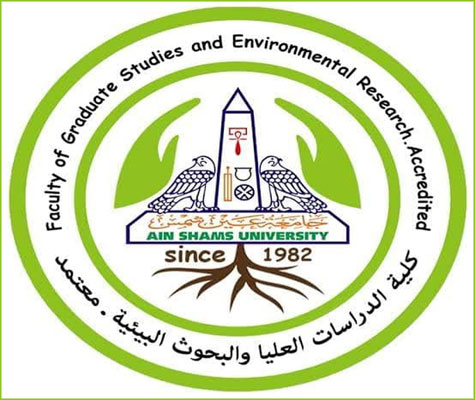Climate Change Conference Recommendations: Green Universities Agenda for COP27
The Climate Change Conference “Green Universities Agenda for COP27” recommended the annual conference of the Faculty of Graduate Studies and Environmental Research at Ain Shams University, which was held online during the period from 21-23 September, to work on reducing the carbon footprint of universities by monitoring and evaluating all university activities in the Faculty, and emphasizing on The role of the media and mediator diplomacy in addressing the issue of climate change.
The conference, which was held under the auspices of Prof. Dr. Mahmoud El-Meteini, President of Ain Shams University, Prof. Dr. Ayman Saleh, Vice President for Postgraduate Studies and Research, Prof. Dr. Ghada Farouk, Vice President for Community Service and Environmental Development, Prof. Dr. Noha Samir Donia, Dean of the Faculty of Graduate Studies and Environmental Research and President of the Conference, and under the supervision of Prof. Dr. Reham Refaat Muhammad, Vice Dean for Graduate Studies and Research, Prof. Dr. Alaa Sarhan, Vice Dean for Community Service and Environmental Development, and Dr. Hoda Helal, director of the Green Transformation Unit at the Faculty, and the conference’s rapporteur, made many other recommendations. This was stated by Prof. Dr. Noha Samir Donia, Dean of the Faculty and President of the Conference.
The recommendations stressed the need to define a mitigation and adaptation plan that aims to reduce the carbon footprint by at least 20% each year to gradually reduce its negative impact until reaching a carbon neutral space during the next five years.
The recommendations also emphasized maximizing the individual’s role in raising awareness of climate change issues, reducing the carbon footprint and maximizing the role of cooperation between public and private universities for green transformation and reducing universities’ carbon footprint, while spreading awareness of integrated waste management, and coordinating with industrial chambers to raise awareness of the production of recyclable products, reuse and rehabilitation to achieve Principles of a rotating economy.
The recommendations also called for moving towards a green and rotating economy to limit climate change, while supporting investments for adaptation and resilience programs for African countries in light of the challenges of high debt and limited fiscal space, and increasing funding for environment and climate-related projects by private and national financing institutions.

.svg)




